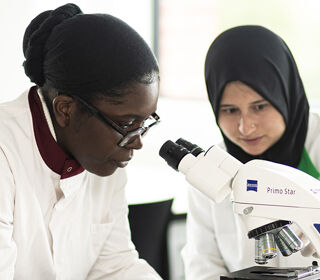
Blog

Interested in studying Biomedical Science, but not sure exactly what it is? Biomedical Scientists are the hidden geniuses of medical research and treatment. Biomedical Science can be an extremely rewarding career - the broad range of specialisms means graduates can help change the course of medicine and how we treat diseases.
The basics
Biomedical science is used to diagnose and treat illnesses and diseases through conducting scientific tests on human fluids, cells and tissue samples within a laboratory. There are different specialisms biomedical scientists can work within, which include infections, blood, cells and genetics. Biomedical scientists work at the cutting edge of medicine to help find answers and treatments for the world’s most threatening diseases.
Biomedical Scientist is a varied role and tasks include running tests on and analysing samples, undertaking research on specialist areas, screening for and identifying diseases and monitoring treatment and medication effects. As well as this, biomedical scientists are extremely proficient at using technology such as microscopes, computers and other laboratory instruments.
One of the exciting parts of being a biomedical scientist is having the chance to be part of scientific breakthroughs that could help fight serious diseases. Think of cancer researchers and the scientists that helped to produce COVID vaccines.
A biomedical scientist's work is critical not only for medical laboratories, but for A&E, operating theatres, blood and transplant services and various other medical departments.
What careers can I go into?
Whilst many biomedical scientists work within a traditional laboratory setting, there are an array of career routes to go down:
- Forensic science: following similar practices of a biomedical scientist, forensic scientists use samples that will act as impartial scientific evidence within a court of law. This important role will support either the defence or prosecution of criminal investigations and involves examining blood, fluids, clothing and other crime scene objects.
- Healthcare science: this is a broad career path with many different avenues including haematology, immunology, genomics and clinical biochemistry. A Biomedical Sciences degree enables you to work within a variety of healthcare-based settings, both patient and non-patient facing.
- Microbiologist: working with microorganisms to understand how they affect our lives. An example of microbiology work comes from BCU’s own Martin Goldberg, who currently works with Birmingham Botanical Gardens on research surrounding antibiotic resistance.
- Physician associate: this role offers a more patient-facing angle, where associates will be based in a GP surgery or hospital alongside doctors. The role entails supporting the diagnosis and management of patients whilst communicating with patients face-to-face.
- Research scientist: a research scientist does what it says on the tin – they conduct experiments and tests to increase knowledge on certain medicinal topics including drugs and treatments.
- Toxicologist: the analysis of toxic materials and radiation on human and animal health. This is an interesting and unique career path that allows an insight into how chemicals can impact our lives.
- Other career paths include scientific writers and teachers, and those who excel in their degree may be able to progress into postgraduate Medicine and Dentistry.
Biomedical Sciences at BCU
The BSc (Hons) Biomedical Sciences course at BCU covers a wide array of the disciplines listed above, ensuring you can find the right field whilst giving you the knowledge and skills to go down your chosen career route.
The course gives you the essential skills required for biomedical sciences careers, offering a practice-led approach to learning in our state-of-the-art life sciences laboratories, which include an array of useful technologies and equipment such as Zeiss interactive microscopes, polymerase chain reaction (PCR) machines and DNA electrophoresis equipment.
Our expert staff have worked and studied within various sectors of life sciences, allowing you to get first-hand knowledge from their real-world experience.